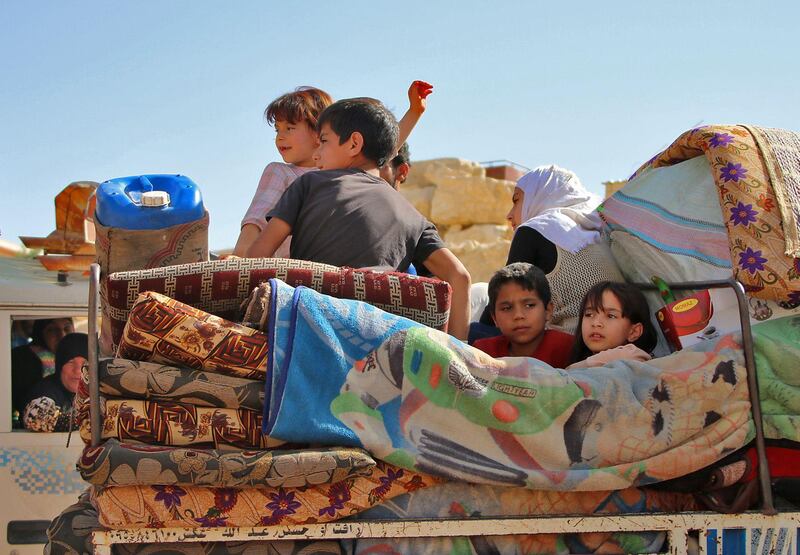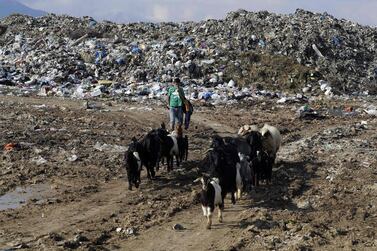There was something heartsinkingly familiar about Gebran Bassil’s declaration that Syrians ought to return home and stop stealing jobs from the Lebanese. We’ve heard it all before, of course; when Theresa May, as British home secretary, brandished vans with messages warning illegal immigrants they should “go home or face arrest”; when Hungarian Prime Minister Viktor Orban complained of “Muslim invaders”; and when Nigel Farage campaigned for Ukip with a poster of migrants reading: “Breaking point: the EU has failed us all”. It wasn’t, and it hasn’t – but that hasn’t stopped politicians from distorting the truth and fuelling a narrative that migrants and refugees are a threat to us all. From Italy to the US-Mexico border, we have seen a groundswell of populism and its rise is taking hold in some parts of the Middle East, too. In the wake of the eight-year Syrian war, politicians like Mr Bassil – Lebanon’s aspirational foreign minister, who has his sights set on becoming the next president – have found in refugees the perfect scapegoats to blame for the country’s woes.
In interviews and tweets, including with The National, Mr Bassil has refused to call Syrians refugees, adding: "We will not be replaced in this land which bore prophets and saints". To the Guardian newspaper in the UK, he described Syrians as "taking jobs from the Lebanese" and to this paper, he said: "Lebanon does not accept Syrians to be refugees, not one of them…[we] have to stop encouraging them from staying in Lebanon". He has even accused Syrians of stashing arms in refugee camps.
Those familiar with Mr Bassil will not be surprised by the cut of his jib. In addition to his ministerial role, he is the leader of the Free Patriotic Movement (FPM), the country’s largest Christian party, which was founded by his father-in-law, Lebanese President Michel Aoun. He has been using this platform to promote his ideology. Earlier this month, he tweeted footage of FPM volunteers protesting outside a restaurant simply because it had hired Syrians. “If you love Lebanon,” he wrote in a tweet accompanying the video, “hire Lebanese staff”. He has even gone as far as to adopt language reminiscent of Nazi rhetoric, referring to Lebanon’s superior genetic make-up. Such incendiary language has been blamed for a spate of attacks on shops and businesses, as FPM youth have targeted, bullied and terrorised those with Syrian employees.
Syrians are now an undeniable part of the landscape in Lebanon, where they make up one-sixth of the populace, the largest number of refugees in the world relative to national population, according to a UNHCR report released this week. Mr Bassil has long pushed for Syrians to return to their country, even as conflict still rages in the northwestern province of Idlib. Some politicians in Lebanon, particularly those who back Bashar Al Assad or have ties to Hezbollah, have been keen to assert regime-held areas are now safe and the war is all but over. The reality, however, is very different. Civilians are far from being safe in Syria. Since April the Syrian regime, backed by Russia, has been barrel-bombing Idlib in an assault that has killed at least 230 civilians so far. Activists have also reported that some of the Syrians who returned to regime-controlled areas have been imprisoned, disappeared or been killed.
Despite this, anti-refugee sentiment is rampant in Lebanon, which in part explains why blatantly racist rhetoric has now become normalised at the very top of the political spectrum. The most common excuse for anti-Syrian sentiment is the state of the economy. Many Lebanese people like Mr Bassil think Syrians are stealing Lebanese jobs by working illegally for low wages, at a time when the economy is already sluggish. But it is the government itself that has made it near-impossible for Syrians to find decent jobs or have legal status. The government asked the United Nations High Commissioner for Refugees to stop officially registering Syrians as refugees four years ago. Since new residency laws were introduced in January 2015, those who want to stay in the country legally have to find a Lebanese sponsor and pay a $200 fee annually, at a time when three-quarters of Syrians in Lebanon fall below the poverty line and rely on aid.
As a result, only one in four of the 1.5 million Syrian refugees in Lebanon have legal residency, according to UNHCR, leaving undocumented Syrians exposed to forced evictions, repatriation and exploitation, with some unscrupulous Lebanese people selling sponsorships for $1,000 a time. Even Syrians who are documented find it difficult to find employment because access to many jobs is restricted to Lebanese citizens. As a result, Syrians are left with few options. They can start their own businesses if they have the means to do so. Otherwise they are limited to low-paying jobs – often below the radar – as labourers, doormen and rubbish collectors, jobs that Lebanese people usually give a wide berth.
The assertion that Syrians are to blame for the ailing economy is also deeply flawed, because it has been struggling for quite some time. The country suffers from mismanagement and corruption at the very top and although the influx of refugees has put a further strain on resources, it is certainly not the cause of the country's woes. Blaming Syrians for these failings is simply a means to detract from the government's own shortcomings. It is far easier for politicians to ride the wave of populism and xenophobia and point the finger than to do something about it.
This push for Syrians to return can only end in tragedy, and is already having an impact on a desperate community. In the northeastern town of Deir Al Ahmar, 600 refugees have been banished from a camp after an altercation between residents and firemen and could be returned to Syria, in what the UNHCR has described as "collective punishment". In Arsal, northeast of Beirut, authorities have decided to demolish illegal concrete structures, a move that will leave 15,000 children homeless.
Lebanon undoubtedly has limited means to provide for a large refugee population and Beirut needs financial help to shoulder the responsibility. But this is no excuse for the way in which the refugee crisis has been handled by authorities. The anti-Syrian policies and disturbing rhetoric are indicative of politicians stoking sectarian divisions. Because most Syrians who fled the war are Sunni Muslims, there are fears that integrating them further into Lebanese society will threaten the country’s fragile stability, with Sunnis eventually outnumbering Shiites and Christians – and their respective parties receiving less support within the population.
Lebanon has survived a 15-year civil war that saw one-fifth of the population displaced. Many of those who remember it suffered under the Assad regime in the 1990s and the subsequent Syrian occupation. The only humane course of action is for those who fled the same hardships to be treated with compassion and respect.






